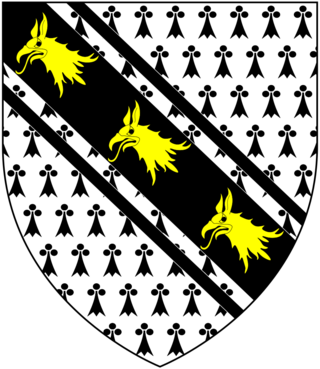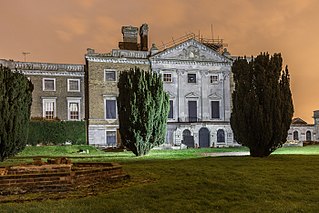Sir William Hustler, of Acklam, Yorkshire, and Little Hatfield, Holderness, Yorkshire was an English draper and Whig politician who sat in the English and British House of Commons between 1695 and 1710. He was a member of the Society for Promoting Christian Knowledge and was great patron of charity schools.

Sir Walter Yonge, 3rd Baronet of Escot in the parish of Talaton, Devon, was an English landowner and Whig politician who sat in the English and British House of Commons between 1679 and 1710.
Sir James Campbell, 2nd Baronet of Ardkinglass, was a British Army officer and Scottish politician who sat in the Parliament of Scotland from 1703 to 1707 and in the British House of Commons from 1707 to 1741.
Lieutenant-General Harry Mordaunt was an English Army officer and Whig politician who sat in the English and British House of Commons between 1692 and 1720.
Sir Thomas Frankland, 2nd Baronet, of Thirkleby Hall in Yorkshire, was an English landowner and Whig politician who sat in the English and British House of Commons from 1685 to 1711. He was joint Postmaster General from 1691 to 1715.
Sir Thomas Frankland, 3rd Baronet, of Thirkleby in Yorkshire, was an English Whig politician who sat in the English and British House of Commons for over 30 years between 1708 and 1741.

Edmund Dunch of Little Wittenham, Berkshire and Down Ampney, Gloucestershire, was an English Whig politician who sat in the English and British House of Commons between 1701 and 1719. He was Master of the Royal Household to Queen Anne.
Sir Thomas Wheate, 1st Baronet, of Glympton Park, Oxfordshire was an English landowner and Whig politician who sat in the English and British House of Commons between 1695 and 1721.
Sir Charles Blois, 1st Baronet, of Grundisburgh Hall and Cockfield Hall, Yoxford, Suffolk, was a British Tory politician who sat in the English House of Commons and the House of Commons of Great Britain between 1695 and 1709.
The Copley baronetcy was first created for Godfrey Copley on 17 June 1661. He was High Sheriff of Yorkshire for 1676–77.
Sir John Holland, 2nd Baronet, of Quidenham Hall, Norfolk was a British Whig politician who sat in the English and British House of Commons from 1701 to 1710.

Sir Thomas Felton, 4th Baronet, of Whitehall, Westminster and Playford, Suffolk, was an English courtier and Whig politician who sat in the House of Commons between 1690 and 1709.
Sir James Howe, 2nd Baronet, of Berwick St Leonard, near Hindon, Wiltshire, was an English Tory politician who sat in the English and British House of Commons between 1698 and 1709.

William Monson, of Broxbourne, Hertfordshire, was an English Whig politician who sat in the English House of Commons between 1695 and 1707 and in the British House of Commons between 1708 and 1722.

Sir Justinian Isham, 4th Baronet was an English landowner and Tory politician, who sat in the House of Commons almost continuously from 1685 until his death in 1730. He was the longest serving member, later termed Father of the House, from 1729 to 1730.
Sir Rushout Cullen, 3rd Baronet (1661–1730), of Upton, Ratley, Warwickshire and Isleham, Cambridgeshire, was an English landowner and Whig politician who sat in the English and British House of Commons between 1697 and 1710.

Sir Thomas Webster, 1st Baronet, of Copped Hall, Essex, and Battle Abbey, Sussex, was a British landowner and Whig politician who sat in the English and British House of Commons between 1705 and 1727.
Leonard Smelt of Kirkby Fleetham, North Riding of Yorkshire, was an English Whig politician who sat in the House of Commons between 1709 and 1740.

Sir Alexander Cumming, 1st Baronet (c.1670–1725) of Culter, Aberdeen, was a Scottish landowner and Tory politician who sat in the House of Commons from 1709 to 1722.
Sir Robert Kemp, 3rd Baronet (1667–1734), of Hoxne and Ubbeston, Suffolk, was an English landowner and Tory politician who sat in the House of Commons between 1701 and 1734.









